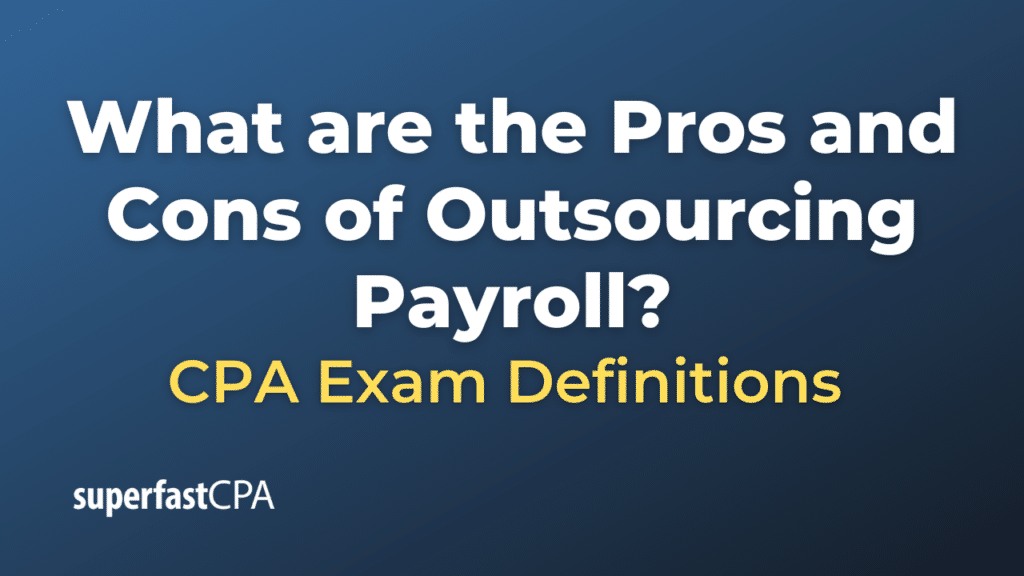Pros and Cons of Outsourcing Payroll
Outsourcing payroll refers to hiring an external service to handle all functions related to payroll, such as salary calculations, tax withholdings, issuing paychecks, and reporting. While outsourcing can offer significant advantages, there are also potential drawbacks to consider.
Pros of Outsourcing Payroll
- Time-saving: Processing payroll can be time-consuming, especially for businesses with a large number of employees. Outsourcing frees up time that can be devoted to core business activities.
- Expertise: Payroll providers are specialists who stay updated with changing tax laws and regulations. This ensures that your payroll is always compliant.
- Cost-effective : For small businesses, the cost of outsourcing payroll can be lower than the cost of hiring and training an in-house payroll team.
- Reduced errors: Professional payroll providers are less likely to make mistakes, which can lead to penalties and disgruntled employees.
- Enhanced security: Payroll processing involves handling sensitive data. Professional payroll providers usually have strong security measures in place to protect this data.
Cons of Outsourcing Payroll
- Less control: When you outsource payroll, you lose some control over the process. This can be a concern if the payroll provider doesn’t fully align with your business needs.
- Dependency: If the provider faces any issues (technical glitches, bankruptcy, etc.), it can disrupt your payroll process.
- Cost: For larger businesses, the cost of outsourcing can be higher than maintaining an in-house payroll department.
- Communication issues: There can be communication gaps or delays in getting responses from the service provider, which can lead to frustration.
- Data privacy concerns: Despite enhanced security measures, outsourcing involves sharing sensitive employee data with a third party, which always carries a risk.
Before making a decision to outsource payroll, it’s important to weigh these pros and cons and consider the specific needs and circumstances of your business. Some businesses may benefit more from outsourcing, while others may find that an in-house payroll department is a better fit.
Example of the Pros and Cons of Outsourcing Payroll
Let’s consider a small business: a local bakery called “Sweet Treats Bakery.”
Scenario: Outsourcing Payroll
Pros:
- Time-saving: The owner, Sarah, currently spends several hours each week calculating payroll, including overtime, deductions, and taxes. By outsourcing, Sarah could focus more on developing new recipes, managing her staff, and expanding the business.
- Expertise: The outsourced payroll provider has a comprehensive understanding of tax laws and regulations. They can handle tax filings on Sarah’s behalf and ensure the business remains compliant, saving Sarah from the need to continually stay updated with tax laws changes.
- Cost-effective: Sarah has a small team of 10 employees. The cost of hiring a dedicated payroll professional or training an existing team member would exceed the cost of outsourcing to a payroll service.
Cons:
- Less control: By outsourcing payroll, Sarah relies on a third-party service. If there are errors or issues, Sarah may not be able to resolve them as quickly as if she were managing payroll internally.
- Dependency: If the payroll provider experiences technical issues, this could lead to delays in her employees receiving their paychecks.
- Data privacy concerns: Outsourcing means Sarah would be sharing sensitive employee data with a third-party, which, despite security measures, involves a level of risk.
After evaluating these pros and cons, Sarah would need to decide if the benefits of outsourcing payroll outweigh the potential drawbacks for her specific situation and business needs. In this example, the advantages seem to outweigh the disadvantages, making outsourcing payroll a viable option for Sweet Treats Bakery.













